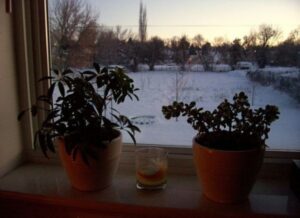Caring for Houseplants in the Winter: 6 Tips

Caring for houseplants in any season can be daunting. Most are sensitive to changes in light, temperature and humidity, and winter can be a most-challenging time for the houseplant-filled home. But with a few simple considerations, you can keep your roofed jungle vibrant and healthy throughout the cold winter months.
Houseplants offer us many benefits. Some can produce food. Others provide pleasant aromas. For some, simply the sheer beauty of watching nature do its thing is rewarding in its own right. Plants also purify and clean the air, which can be particularly important when windows are sealed up for the winter–which is why it’s important to give these tips some extra attention during the winter:
1. Mind the temperature: Typically most houseplants do best at temperatures of 65-75 degrees Fahrenheit during the day and no less than 50 degrees at night. Cold temperatures can damage plants. Move them away from drafty windows and doors, especially at night. As well, make sure they’re not located directly next to a radiator or heat vent where excessively hot air can also cause damage.
2. Monitor humidity: Winters are dry—much drier than most houseplants prefer. You can increase humidity with a simple humidifier and by keeping plants close to one another. Transpiration will improve the humidity in the immediate area. You can also place plants on trays filled with small rocks or pebbles and water, which will hold in the humidity.
3. Water less: Because winter time slows the growth cycles for most plants, they also need less water. Some species require more water than others, and misting with a spray bottle is the most effective method for watering house plants.
4. Don’t fertilize: Save fertilizers for spring and summer, when the plants are doing more of their growth.
5. Clean the leaves: Dust and other grime builds up in the house more quickly during the winter because windows and doors are closed more often. They can create residue that builds up on the leaves and make it difficult for the plants to breathe. Using a soft cloth and a gentle touch, you can easily remove some of the irritants that can hinder your plants in winter.
6. Follow the sun: While you want to avoid letting your plants touch cold windows or catch the draft seeping in from them, you do want to give your plants more light in the winter. Make sure you rotate them every few days so they get even light exposure.
Keep in touch with Jill on Twitter @jillettinger
Image: Shawn Econo

